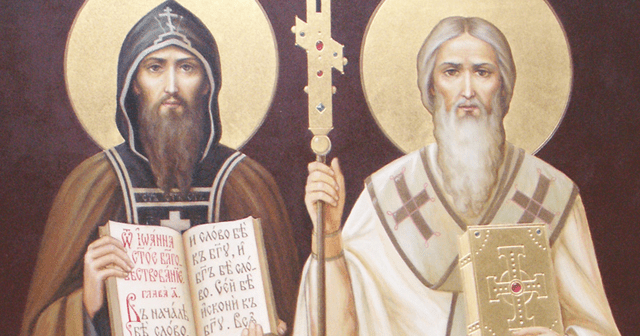Because their father was an officer in a part of Greece inhabited by many Slavs, these two Greek brothers, Saints Cyril & Methodius, ultimately became missionaries, teachers and patrons of the Slavic peoples.
After a brilliant course of studies, Cyril (called Constantine until he became a monk shortly before his death) refused the governorship of a district such as his brother had accepted among the Slavic-speaking population. Cyril withdrew to a monastery where his brother Methodius had become a monk after some years in a governmental post.
A decisive change in their lives occurred when the Duke of Moravia (present-day Czech Republic) asked the Eastern Emperor Michael for political independence from German rule and ecclesiastical autonomy (having their own clergy and liturgy). Cyril and Methodius undertook the missionary task.
Cyril’s first work was to invent an alphabet, still used in some Eastern liturgies. His followers probably formed the Cyrillic alphabet (for example, modern Russian) from Greek capital letters. Together they translated the Gospels, the psalter, Paul’s letters and the liturgical books into Slavonic, and composed a Slavonic liturgy, highly irregular then.
That and their free use of the vernacular in preaching led to opposition from the German clergy. The bishop refused to consecrate Slavic bishops and priests, and Cyril was forced to appeal to Rome. On the visit to Rome, he and Methodius had the joy of seeing their new liturgy approved by Pope Adrian II. Cyril, long an invalid, died in Rome 50 days after taking the monastic habit.
Methodius continued mission work for 16 more years. He was papal legate for all the Slavic peoples, consecrated a bishop and then given an ancient see (now in the Czech Republic). When much of their former territory was removed from their jurisdiction, the Bavarian bishops retaliated with a violent storm of accusation against Methodius. As a result, Emperor Louis the German exiled Methodius for three years. Pope John VIII secured his release.
The Frankish clergy, still smarting, continued their accusations, and Methodius had to go to Rome to defend himself against charges of heresy and uphold his use of the Slavonic liturgy. He was again vindicated.
Legend has it that in a feverish period of activity, Methodius translated the whole Bible into Slavonic in eight months. He died on Tuesday of Holy Week, surrounded by his disciples, in his cathedral church.
Opposition continued after his death, and the work of the brothers in Moravia was brought to an end and their disciples scattered. But the expulsions had the beneficial effect of spreading the spiritual, liturgical and cultural work of the brothers to Bulgaria, Bohemia and southern Poland. Patrons of Moravia, and specially venerated by Catholic Czechs, Slovaks, Croatians, Orthodox Serbians and Bulgarians, Cyril and Methodius are eminently fitted to guard the long-desired unity of East and West. In 1980, Pope John Paul II named them additional co-patrons of Europe (with Benedict).
















On St. Val’s day when i woke up the first thing that come to mind wasn’t that it was Val’s day but that it was the fest day of the patron saints of my church, if that doesn’t mean anything coming from a 17 year old then i dont know what does.
two great saints indeed.
[…] uCatholic […]
[…] uCatholic […]
I received my first communion at SS Cyril & Methodius Church in Lakewood,OH so I have a great affection for these great saints! They had a Mass in Slovak on Sunday up until a few years ago when it was unfortunately discontinued. I was able to attend a Slovak Mass there before it stopped and it was great. I don’t speak the language but it was awesome to celebrate the Liturgy the way these saints did for these people.
Hello from Ames, Iowa. Did the church in Ohio close up or still having Mass? My sons live near Akron but do not go to Mass on regular basis. When I was growing up in central NJ from 1950 to 71, I was baptized and confirmed on same day at St. Nicolas Byzantine Church, but I attended a Roman Catholic grade school for 8 years. I usually went to Mass
on Sundays at St. Nicholas with my father.
We had a dynamic and hard-working priest and church members raised enough money after 25 years to build a larger and modern church 2 miles away. The congregation was older and many died during 1980s and there were less projects to make money. Our exceptional priest died and his replacement was elderly and did not try to find new members or raise money. After 2005, it was hard to pay the bills and Church was sold to a Hindu group who had to remodel both inside and out. They have been very successful because there are many educated professionals in central NJ and their families immigrated from India and they sponsored more people every year.
I still remember all of the happy family events that occurred at St. Nicholas: my sister’s marriage, baptism and confirmation of my 4 children, and funeral for my father. We should never forget the importance of our church in our lives — celebrating the good times and getting love and support during the bad times.
Thank the saints for paving the way for many catholic..
Saints Cyril & Methodius, pray for us!
Saints Cyril and Methodius, the missionaries, help us to be like you both.